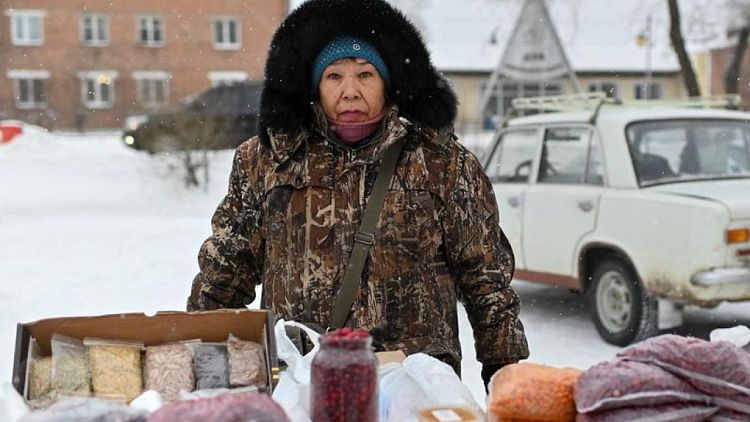By Alexey Malgavko and Gabrielle Tétrault-Farber
TARA, Russia - Siberian pensioner Gulsina Zhemaletdinova worries she won't have anything to serve her family when they gather around the table to celebrate the new year.
Like most Russians, the 60-year-old has seen her purchasing power shrink drastically in recent months as inflation has spiralled to its highest in nearly six years, compounding years of falling or stagnant real wages.
The Kremlin has voiced concern about the rise in prices, which President Vladimir Putin has described as a sensitive issue for Russians, especially low-income families in far-flung regions. The issue is delicate for the Kremlin too, which strives for economic stability and wants to contain discontent that might dent Putin's popularity.
Bundled in a camouflage winter coat, Zhemaletdinova sells cranberries, honey and pantry items to supplement her meagre 9,000-rouble ($122) monthly pension at an outdoor market in Tara, a town of 28,000 in the Omsk region bordering Kazakhstan.
After paying her utilities bill, Zhemaletdinova has little left to spend on necessities.
"We buy and eat scraps that are meant for dogs," she told Reuters. "We won't celebrate the holidays. What will I put on the table?"
Food prices last month were more than 10% higher overall than during the same period last year, according to state statistics agency Rosstat. Prices for meat and poultry have jumped nearly 19%, while eggs are 26% dearer than in 2020.
"People in the provinces, they are more hurt because inflation disproportionately falls on the poor, especially when there is a spike in food inflation," said Konstantin Sonin, professor at the University of Chicago and HSE University in Moscow. "The government doesn't care much about people outside of Moscow and St. Petersburg."
In a bid to curb annual inflation, which stood at 8.4% last month, the Russian central bank is expected to hike its key interest rate on Friday for the seventh time this year.
TOP CONCERN
A poll by the independent Moscow-based Levada Centre in October found the increase in prices was by far Russians' top concern, outweighing issues such as poverty and unemployment.
Polls show inflation has been Russians' main preoccupation for many years, even when prices were lower. But the combination of rising prices and other economic woes could result in a slight decrease in Putin's approval rating, currently 63%, according to the Levada Centre.
"With the combination of a stagnation in real disposable incomes, rising prices can have an unpleasant effect on the popular mood," said Andrei Kolesnikov, a senior fellow at the Carnegie Moscow Center.
"The state views the lower middle class and the poor segments of the population as the social base of its support. Politically this is a very important and serious issue for the authorities."
Alexei Navalny, a Kremlin critic and anti-corruption campaigner imprisoned on embezzlement charges he says are politically motivated, has admonished the authorities for failing to rein in prices, something he said was noticeable even in jail.
He said prices at the kiosk selling food to prisoners had skyrocketed, and he would like to see Putin survive on a pension.
"Russian cheese now costs 237 roubles," Navalny posted on Instagram on Tuesday via his lawyers. "I just glance at it and think: this the food of oligarchs."
Kremlin spokesperson Dmitry Peskov said on Thursday that Putin had ordered that everything possible be done to bring inflation down.
Maria Komissarova, a mother of three shopping for groceries in Tara, has yet to notice the effect of measures taken by the authorities.
"Now you can't buy as much for the same amount," the 29-year-old said. "It's scary to go to the store with 1,000 roubles ($13.60). It feels like it won't be enough to pay for anything."
